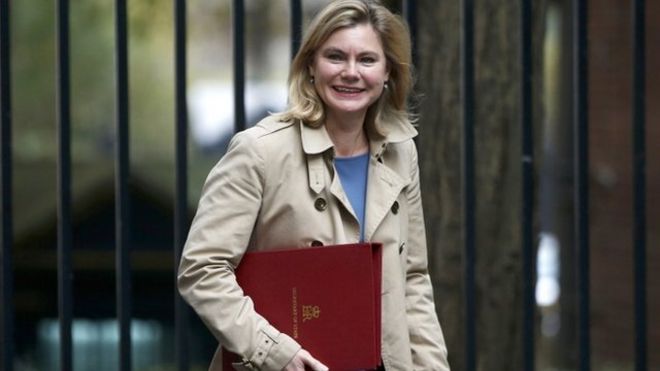
The biggest shake-up of school funding in England for decades will see less money for big cities such as London, Manchester, Liverpool and Birmingham and bigger budgets for schools in the suburbs and shires.
Education Secretary Justine Greening has announced a new national funding formula for schools from 2018-19, saying it would resolve “unfair” and “inconsistent” funding levels.
But it will not increase the overall budget – and the National Audit Office says schools face cuts of £3bn.
Winners and losers
Schools across inner London will see their funding cut. For a big secondary school in the capital, an annual cut of 1.5% could be £150,000 less per year.
There will be reductions across other big cities in the north and midlands.
Most schools in Birmingham and Coventry will have reduced budgets. In the north west there will be less funding for many schools in Manchester, Liverpool, Wigan and Warrington – but increases in Blackpool and Bolton.
More funding will go to the suburbs and shire counties.
While many schools in Greenwich will lose funding, nearby Bromley will see schools gaining. Many Barking schools will have less cash, while many in Essex will have more.
Many secondary schools in places such as Buckinghamshire, West Sussex, Bath, Bournemouth and Cambridgeshire stand to see budgets increasing.
Head teachers welcomed a more transparent way of allocating money between schools – but warned that it did not address the bigger question of the overall funding gap.
“A change in how funding is distributed is important but it will not solve this fundamental lack of investment,” said Russell Hobby, leader of the National Association of Head Teachers.
‘Level playing field’
Malcolm Trobe of the ASCL head teachers’ union supported the government for grasping the nettle of unfair regional differences in funding.
But he warned that it did not resolve the budget shortfalls facing schools.
The new national funding formula is designed to stop inequalities that see schools in different parts of the country, with similar intakes, receive different levels of per-pupil budget.
“We need a system that funds schools according to the needs of their pupils rather than their postcode, levelling the playing field,” said Ms Greening.
She said that a school in Barnsley could receive 50% less than a school facing similar challenges in Hackney in east London.
Redressing such imbalances will mean significant differences for schools budgets – and the education secretary announced transitional arrangements to cushion the impact.
Individual schools will not lose more than 3% in per-pupil funding in the new funding formula.
Those schools that will be winners can see increases of up to 3% in the first year and then 2.5% in the following year.
Winning and losing cash
It will mean individual schools gaining or losing hundreds of thousands of pounds each year, with implications for staffing and resources.
The F40 group, representing councils – including a number of shire counties that had received less funding – welcomed the changes, saying they “appear to present a fairer method of funding”.
But a group representing schools in the North East said the changes would divert funding from “disadvantaged areas to affluent boroughs”.
There will be extra funding for “sparsity”, such as rural areas and small schools, places with a high level of mobility in its school population and funding where there are sharp increases in pupil numbers.
But it is expected that there will be an overall reduction in budgets for London schools, which have had bigger budgets.
These changes in allocation are against a backdrop of growing complaints about funding shortages.
Five head teachers’ and teachers’ unions issued a joint statement on Wednesday saying schools faced the “biggest real-terms cuts in a generation”.
An analysis from the public spending watchdog, the National Audit Office, says state schools in England will have to find £3bn in savings by 2019-20.
Schools face 8% budget cuts, and about 60% of secondary schools already have deficits, it warns.
It says that schools are not prepared for the “scale and pace” of the cuts facing them.
Ann Lyons, head teacher at St John Fisher Catholic Primary School in north-west London, said that her school was already struggling to maintain services and was cutting activities.
“We’ve been relatively well protected but we are now at the stage we’re at breaking point and the only way some schools are going to manage this significant cut in real terms is through staff cuts – and that’s going to add to workload,” she said.
Head teachers in West Sussex have warned that lack of funding could mean cutting school hours.
Almost every state school head in the local authority had written to Prime Minister Theresa May in the autumn warning of the “dire financial position”.
Angela Rayner, Labour’s shadow education secretary, said: “We support the principle of a fairer funding formula for schools, but the government is simply moving inadequate sums of money around.
“The Tories are cutting budgets overall, and schools are struggling to plug the gaps. We are reaching a point where the only thing schools will have left to cut are qualified teachers.”
[Source:- BBC]








